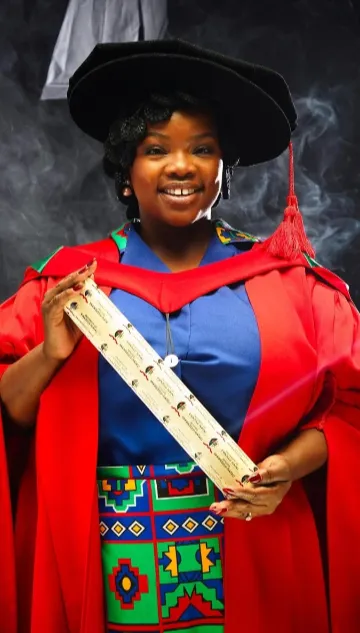Honouring domestic workers, Dr Ntini-Makununika's PhD challenges societal norms

Dr Thobeka Ntini-Makununika wearing a domestic worker's uniform under her gown.
Image: Supplied
Dr Thobeka Ntini-Makununika has made history in her family by breaking the cycle of poverty when she recently graduated with a PhD in social work.
Wearing a domestic workers' uniform under her graduation gown, she sent a powerful message during the ceremony at the University of KwaZulu-Natal (UKZN), honouring her mother, aunt, late grandmother, and the thousands of domestic workers who came before her.
Dr Ntini-Makununika has been a passionate voice calling for the recognition of domestic work as decent labour.
As someone whose PhD journey began not in academia but in the homes where her family worked, she aims to challenge power dynamics within South African households. Her doctoral study, titled 'Unravelling the Dynamics of Power in the Employer-Domestic Worker Relations in Contemporary South Africa, KwaZulu-Natal: Praxis-Oriented Research', delves deep into these hidden dynamics.
“Education, for me, is resistance. I carry the sacrifices of generations of women in my family into every chapter I write,” she said.
Raised in a lineage of black African women who survived through domestic work, Dr Ntini-Makununika’s perspectives are deeply rooted in lived experiences.
At just 13, she worked part-time for white families and in holiday resorts, gaining first-hand insights into the layered dignity, quiet suffering, and complex dependencies that define employer-domestic worker relationships.
Her research has garnered praise, with examiners noting its 'exceptional empirical work in scope and originality.'
“I wanted to humanise domestic work, redefine its societal value, and inspire reflection and action. It’s a call to reconsider whose labour we honour, whose voices we centre, and what justice truly looks like,” she said.
Dr Ntini-Makununika approached her research with a participatory mindset, facilitating dialogue rather than viewing her subjects as mere data points. This engagement allowed domestic workers to assert their agency, while employers also encountered moments of vulnerability that shifted their understanding.
The research revealed a complex reality: exploitation transcends race, and power in domestic contexts relates more to social status and internalised oppression than ethnicity.
“Some employers clearly stated for themselves, they start work at 7.30am and finish at 4pm. However, they were vague or dismissive when asked about their workers’ hours. It signalled a devaluation of their employees’ time,” she said, adding that her tenure at the University of Zululand, a historically disadvantaged institution, further informed her understanding of systemic inequality.
“I wasn’t writing just for academic study, I was writing for the daughters of domestic workers who may one day read my work,” she said.
However, the emotional toll of fieldwork was significant, as recalling stories of unpaid dismissals and micro-aggressions often triggered painful memories. Yet her commitment to revealing the truth made the process worthwhile, leading to moments of awakening for both domestic workers and employers.
Dr Ntini-Makununika argues for systemic change, noting that domestic work is still entangled in colonial and capitalist legacies.
“We need a shift in values. Grounding policy and practice in Ubuntu can help affirm the humanity and dignity of domestic workers,” she said.
Her path to earning her doctorate required discipline, support, and significant personal resolve. She credits her manager, Professor John Rautenbach, and her peers for their camaraderie, as well as her supervisor, Professor Vishanthie Sewpaul, for her guidance.
“Until we value the hands that clean our homes and raise our children as much as those that govern boardrooms, we will never dismantle the inequality woven into our daily lives. Domestic work is work. Let us ensure it is decent work,” she said.

Dr Thobeka Ntini-Makununika with her PHD.
Image: Supplied
Related Topics: